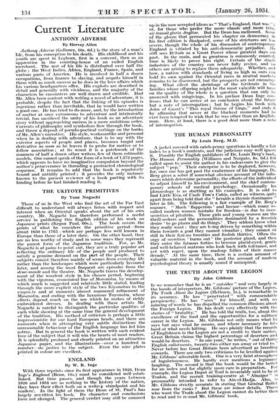ENGLAND
By W. R. Inge
With three reprints since its first appearance in 1926, Dean Inge's England (Bean, 18s.) must be considered well estab- lished. But time passes, and though the years. between 1926 and 1934 arc as nothing -in the history 'of the nation, they have their effect both on a writeci• standpoint and his readers'. In the light of them the D.ean of St. Paul's has largely rewritten his book: Its character and conclusions have not changed. The general- verdict may still be summed up in the now accepted idiom as " That's England, that was " ; or, for -those who prefer 'the more' classic and more trite, sic transit gloria Angliae. But the Dean has melloWed.. Some of the gloom that permeated his chapter on democracy in his first edition is dissipated, some of his strictures are less severe, though the whole of his discussion of contemporary England is vitiated by his anti-democratic prejudice. lie still sees Britain as a Great Power whose greatest days are past. In the main,. and as greatness is commonly counted, time is likely to prove him right. Certain of the staple industries of the country can never fully revive, and no others are arising to replace them adequately. Whether, and how, a nation with standards of living as high as ours can hold its own against the Oriental races in neutral markets remains to be discovered, but the prospects are not encourag- ing. What effect the shrinkage of the birthrate in the families whose offspring might be the most valuable will have on the quality of the whole is a question that can only be answered with misgivings. In his preface Dean Inge con- fesses that he can arrive at no conclusion about the future but a note of interrogation ;, but he ,begins his book with John of Gaunt's "This royal throne of kings," and ends it by affirming that never at the blackest moments had' he ever been tempted to wish that he was other than an English- man. Here, at least, there is a good deal more than a note of interrogation.










































 Previous page
Previous page